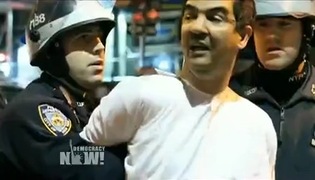
By Amy Goodman with Denis Moynihan
We got word just after 1 a.m. Tuesday that New York City police were raiding the Occupy Wall Street encampment. I raced down with the “Democracy Now!” news team to Zuccotti Park, renamed Liberty Square. Hundreds of riot police had already surrounded the area. As they ripped down the tents, city sanitation workers were throwing the protesters’ belongings into dump trucks. Beyond the barricades, back in the heart of the park, 200 to 300 people locked arms, refusing to cede the space they had occupied for almost two months. They were being handcuffed and arrested, one by one.
The few of us members of the press who managed to get through all the police lines were sent to a designated area across the street from Zuccotti Park. As our cameras started rolling, they placed two police buses in front of us, blocking our view. My colleagues and I managed to slip between them and into the park, climbing over the trashed mounds of tents, tarps and sleeping bags. The police had almost succeeded in enforcing a complete media blackout of the destruction.
We saw a broken bookcase in one pile. Deeper in the park, I spotted a single book on the ground. It was marked “OWSL,” for Occupy Wall Street Library, also known as the People’s Library, one of the key institutions that had sprung up in the organic democracy of the movement. By the latest count, it had accumulated 5,000 donated books. The one I found, amidst the debris of democracy that was being hauled off to the dump, was “Brave New World Revisited,” by Aldous Huxley.
As the night progressed, the irony of finding Huxley’s book grew. He wrote it in 1958, almost 30 years after his famous dystopian novel, “Brave New World.” The original work described society in the future where people had been stratified into haves and have-nots. The “Brave New World” denizens were plied with pleasure, distraction, advertisement and intoxicating drugs to lull them into complacency, a world of perfect consumerism, with lower classes doing all the work for an elite.
“Brave New World Revisited” was Huxley’s nonfiction response to the speed with which he saw modern society careening to that bleak future. It seemed relevant, as the encampment, motivated in large part by the opposition to the supremacy of commerce and globalization, was being destroyed.
Huxley wrote in the book: “Big Business, made possible by advancing technology and the consequent ruin of Little Business, is controlled by the State—that is to say, by a small group of party leaders and the soldiers, policemen and civil servants who carry out their orders. In a capitalist democracy, such as the United States, it is controlled by what Professor C. Wright Mills has called the Power Elite.” Huxley goes on to write, “This Power Elite directly employs several millions of the country’s working force in its factories, offices and stores, controls many millions more by lending them the money to buy its products, and, through its ownership of the media of mass communication, influences the thoughts, the feelings and the actions of virtually everybody.”
One of the People’s Library volunteers, Stephen Boyer, was there as the park was raided. After avoiding arrest and helping others with first aid, he wrote: “Everything we brought to the park is gone. The beautiful library is gone. Our collection of 5,000 books is gone. Our tent that was donated is gone. All the work we’ve put into making it is gone.”
New York City Mayor Michael Bloomberg’s office later released a photo of a table with some books stacked on it, claiming the books had been preserved. As the People’s Library tweeted: “We’re glad to see some books are OK. Now, where are the rest of the books and our shelter and our boxes?” The shelter, by the way, was donated to the library by National Book Award winner Patti Smith, the rock ‘n’ roll legend.
Many other Occupy protest sites have been raided recently. Oakland Mayor Jean Quan admitted to the BBC that she had been on a conference call with 18 cities, discussing the situation. Another report noted that the FBI and Homeland Security have been advising the cities.
A New York state judge ruled late Tuesday that the eviction will stand, and that protesters cannot return to Zuccotti Park with sleeping bags or tents. After the ruling, a constitutional attorney sent me a text message: “Just remember: the movement is in the streets. Courts are always last resorts.” Or, as Patti Smith famously sings, “People Have the Power.”
Amy Goodman is the host of “Democracy Now!,” a daily international TV/radio news hour airing on more than 950 stations in North America. She is the author of “Breaking the Sound Barrier,” recently released in paperback and now a New York Times best-seller.
© 2011 Amy Goodman












Media Options